The new automotive competition is on the rise: After Japan and South Korea, China, the third East Asian nation, is entering the global automotive market. Until the end of the pandemic, logistics were a bottleneck. However, the transport difficulties have since been resolved, as Christian Domke-Seidel writes. This year, China will export four million good, affordable cars for the first time. This should make the German automotive industry nervous. Spoiler: It is not primarily roaring combustion engines from China that are in high demand.
The complaint filed by the European Center for Constitutional and Human Rights (ECCHR) with the Federal Office for Economic Affairs and Export Control (BAFA) continues to concern us. The exact origin of many parts used by BMW, VW and Mercedes in China is still unclear. Many important suppliers produce in the Xinjiang province. Markus Krajewski, a law professor at the University of Erlangen-Nuremberg, assesses the validity of the complaint in an interview with Caspar Dohmen.
On Thursday, Olaf Scholz apparently wanted to somewhat make up for the damage caused by his cozy approach with Li Qiang. Scholz had adapted to China’s political culture on Tuesday and did not allow any questions during the “press conference” at the Chancellery. In front of the Bundestag, he reiterated Germany’s support for Taiwan and stated that he had warned Premier Li against any aggression towards the island state. The uneasy feeling after China’s propagandistic 1-0 victory in Berlin remains.

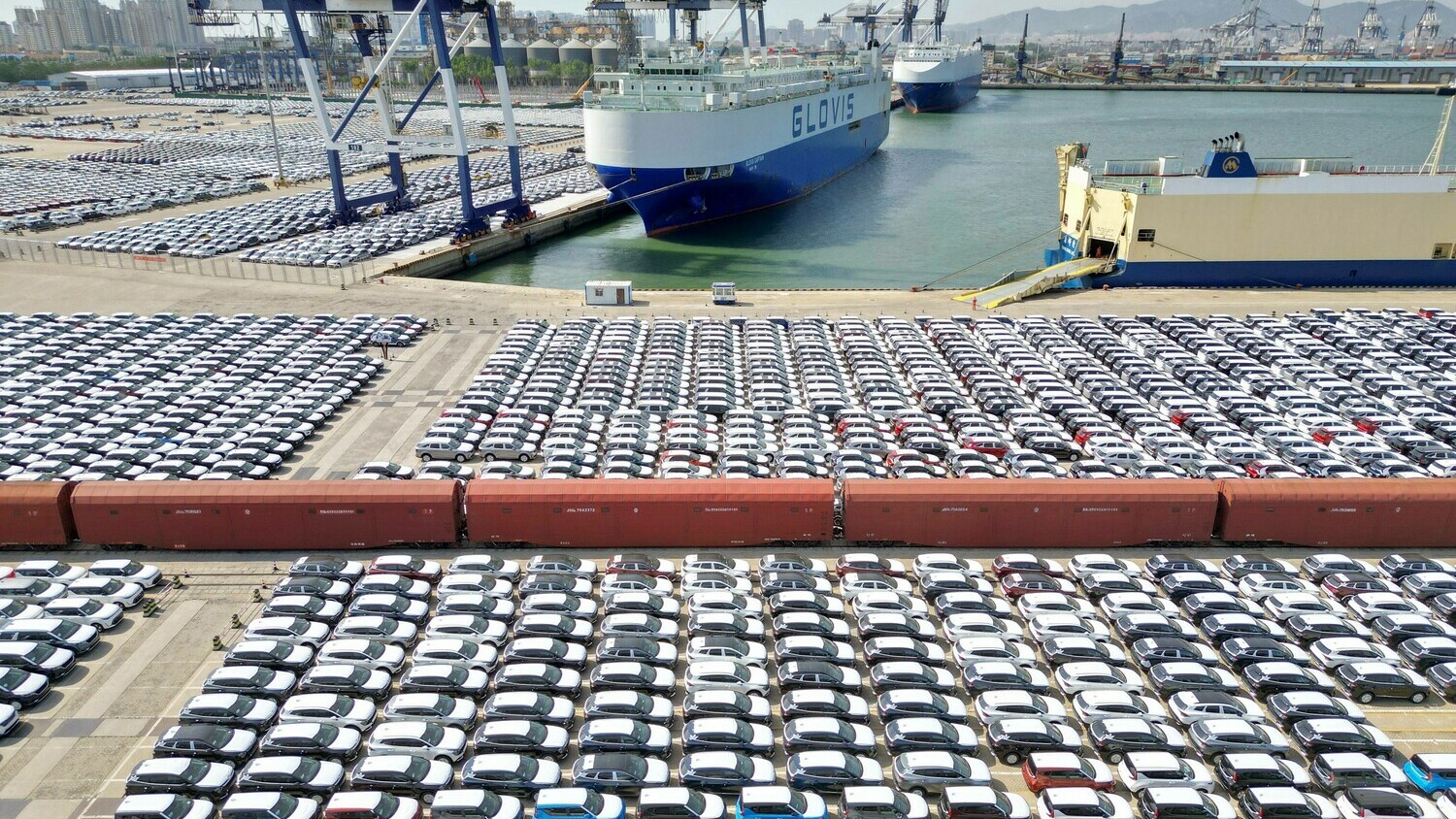
One in four cars built by Chinese manufacturers for export could not be exported last year. The capacities on ships and rail were too low. Now the People’s Republic is catching up because the supply routes have become accessible. In the first quarter of 2023 alone, almost 1.07 million vehicles left the country.
In 2022, Chinese automakers exported 3.1 million vehicles – this also marks an increase of 54 percent compared to the previous year. However, the manufacturers had built significantly more vehicles for export: more than four million units. One million vehicles were therefore left standing. For one simple reason: There was a lack of transport capacity. This is just beginning to change. The reason for this is new ships and flourishing rail traffic.
The development of new transport routes by rail is relieving the overburdened shipping traffic and boosting exports. For the current year, analysts expect China’s automakers to export more than four million cars for the first time. This would mean that the People’s Republic would replace Japan as the leading car export country. This has already been achieved in the first quarter: With the good 1 million vehicles that the country exported, according to the Chinese customs authority, it surpassed Japan’s 955,000 export cars.
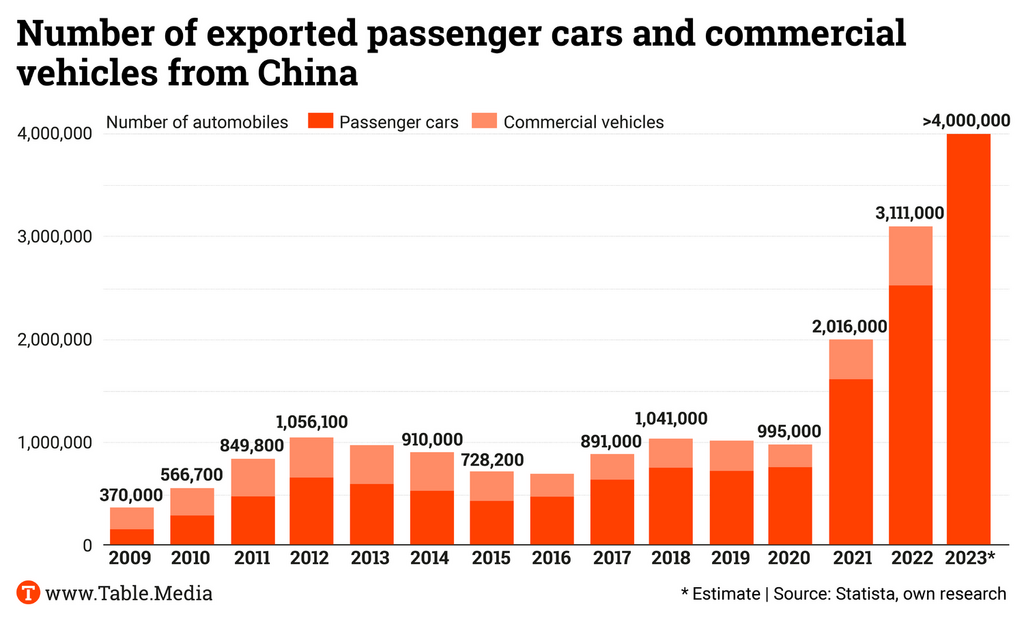
The German car market is also feeling the effects of this development, as the Federal Statistical Office calculates. 28 percent of all cars that entered Germany from abroad came from China in the first quarter. Their share tripled compared to the same period last year.
A key problem for Chinese auto brands last year was export capacity. There was simply a lack of ships. More precisely: so-called RoRo ships. The name stands for “roll on – roll off” and means ships onto which cars and trucks can drive directly without first having to be packed into containers.
This makes loading easy and keeps the port infrastructure simple. Nor do modern cranes need to be used for this type of ship. The Clarkson consulting agency calculates that there are 760 RoRo ships in operation worldwide. However, only 51 of these are in Chinese hands, and they mainly serve domestic traffic.
China’s demand is therefore putting a steep upward pressure on the cost of renting these ships. In the past three years, the daily rent has increased eightfold to around 90,000 dollars, Caixin Global calculates. A trip to Europe would thus cost 5.4 million dollars. This is a real stumbling block for the industry, which currently still has to calculate with tight margins.
Last year, therefore, automakers made investments of their own. BYD, for example, has ordered eight RoRo vessels, each capable of carrying 7,700 vehicles, at a combined cost of nearly 700 million dollars. SAIC Motor has ordered vessels for about 300 million dollars. Bank of Communications Financial Leasing, which leases transportation equipment such as aircraft, ships and trucks and offers capacity to the market, has also recognized the demand and ordered a total of 43 RoRo vessels.
The export boom is also being boosted by the trend toward EVs. Every third vehicle that left China in the first five months of this year was electric. In May alone, there were 92,000 of the so-called New Energy Vehicles (NEV) – an increase of 136 percent compared to the same month last year. The increase is also due to the fact that sales growth in the People’s Republic has slowed down and a tough price war has broken out. Many manufacturers, therefore, prefer to focus on exports, where Chinese vehicles – especially NEVs – are gaining in popularity.
Until the fall of 2022, the NEVs placed an additional burden on the ports because batteries for EVs were not allowed to be transported by rail in China until then – for safety reasons. In spring 2021, Geely CEO Li Shufu submitted a request to the government to change the regulation. “Compared with sea and road transport, rail transport has enormous advantages, especially for long distances, in terms of economy, stability and CO2 emissions,” he said at the time, explaining the reason for the application.
Especially with regard to the New Silk Road and the plans of the Communist Party in the decarbonization and central industry development sectors, the move seemed to be well received. Since the end of last year, batteries, along with the cars around them, are now allowed to be transported by rail.
The announcement of the relaxation in battery transport regulations has triggered massive investments in the rail transport sector. For example, logistics company Toprail in Shanghai has provided twenty additional trains dedicated solely to NEV (New Energy Vehicles) transportation.
Brian Jang, Product Manager at Dachser Logistics in China and responsible for rail transport, expressed to the specialized portal New Silkroad Discovery: “NEVs will become another major product of Eurasian freight trains, following notebooks and white goods. We will see more trains for NEVs.”

What is the significance of ECCHR’s complaint to BAFA?
They basically point out to BAFA that the companies have not fulfilled their legal due diligence obligations. BAFA even provides a website for that, after all. It’s like a notice to an administrative authority. You could also go to the public order office and say, I think my neighbor is always dumping paint down the drain. Then the public order office has to consider whether or not to follow up on the tip. And in the same way, BAFA must now consider whether it wants to follow up on the current indications of the complaint.
In the complaint, ECCHR does not name any specific affected parties. Can one then still file such a complaint with BAFA?
Yes, one does not have to name any specific complainants, but it must be clearly expressed what types of due diligence violations might exist. Later, this could become important if BAFA does not act or does not act sufficiently in the eyes of the complainants. Then the complainants have the possibility to file a lawsuit against BAFA before the administrative court. This could be the next step.
The main reason for the complaint is that the information provided by the German automakers to date is insufficient to assess the extent to which they have addressed the risk of forced labor in the Xinjiang region in accordance with the requirements of the Supply Chain Act. Does the Supply Chain Act mean that companies have to show more transparency in this regard?
That is the idea of the law. They are required to report on what they have done specifically now. Practice will have to show how exactly this works now and what BAFA considers necessary. But I would say that if companies have been made aware of any human rights risk, then they have a duty to conduct follow-up research and must report transparently on what they have done. In any case, the law provides for significantly increased reporting and transparency obligations compared to what we had before. Previously, there was basically only an obligation based on the CSR reporting mandates.
Does BAFA now have to check whether the companies have plausibly fulfilled their obligations?
Yes, it has to actively check what the companies have done. To do this, it must come to an assessment itself. It also has the competence to evaluate the situation itself. But it does not have to take action in every case. If someone raises a complaint against a company about possible forced labor in the Upper Palatinate, and the company concerned says in a comprehensible way that this is nonsense, then the authority does not have to take action. There must be clear evidence of the risk in the region.
Now companies often say that they themselves, or even third parties such as auditors, cannot actually independently assess the situation in Xinjiang from a human rights perspective. And now China has also passed an anti-espionage law, making obtaining information more difficult. At the end of the day, is the only option left for companies to withdraw from the region if they want to act in accordance with the German supply chain law?
You have to be clear about that. There are enough well-documented reports on the human rights situation and forced labor in the Xinjiang region regarding automotive supply chains. If one were to speak about criminal law now, there would be an initial suspicion. If companies can’t refute that suspicion or say, we can’t adequately assess our risks, then they have to give up that business activity. Because according to the law, you are not allowed to have any areas in your supply chain where you are not at all able to assess the human rights risks.
June 27,2023, 08:30 a.m. (2:30 p.m. Beijing time)
China Network Baden-Wuerttemberg, Workshop: Michael Shi: Success Factors for Trade Fairs More
June 27, 2023; 10 a.m. (4 p.m. Beijing time)
EU SME Centre, Webinar: Build a Strong Team in China: Mastering the Art of Hiring and Training Talent More
June 27, 2023; 9 p.m. (June 28, 3 a.m. Beijing time)
Center for Strategic & International Studies, Webcast: Promoting Semiconductor “Friendshoring”: The Role of Indo-Pacific Allies and Partners in Supply Chain Resilience More
June 28, 2023; 3 p.m. (9 p.m. Beijing time)
Center for Strategic & International Studies, Webcast: Thirteenth Annual South China Sea Conference More
June 29, 2023; 10 a.m.
Zhejiang Government / PwC Germany / PwC China, Networking Event (Frankfurt): Zhejiang – Germany Business Dialogue More
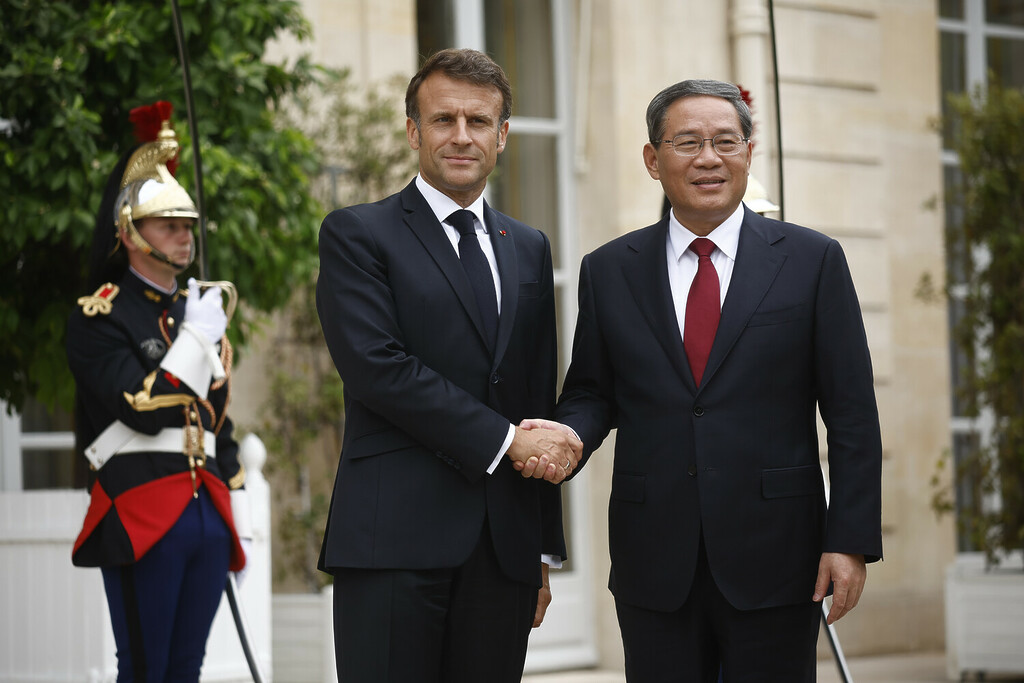
China’s Premier Li Qiang has traveled on to France following German-Chinese government consultations, where he took part in a summit for a new global financing pact. The summit, organized by French leader Emmanuel Macron, will be held on Thursday and Friday. A speech by Li Qiang is expected on Friday.
The financial summit in Paris will focus, among other things, on how the international financial system can be restructured to support poorer countries in overcoming the climate crisis, for example, through debt relief. China was explicitly invited to the summit at Macron’s request. That’s because the People’s Republic, which is the world’s largest bilateral creditor, is pushing for lenders such as the World Bank or the International Monetary Fund to absorb some of the losses should countries be unable to repay their debts. Financial institutions and richer countries oppose that. That is why Li’s speech is eagerly awaited.
On the first day of the summit, the participants talked about a possible taxation of maritime traffic. Neither China nor the US, however, had expressed a positive view of the move, Table.Media learned on the ground. Most of the countries supporting the idea are from Europe, Asia and the Pacific region. Partnerships for green growth and CO2 pricing were also debated.
Earlier on Wednesday, Li Qiang met France’s Prime Minister Élisabeth Borne and French Economy Minister Bruno Le Maire. Li also attended a dinner of the France-China Committee, a group of French industrialists with business in China. Members include the heads of leading French companies, including L’Oréal, BNP Paribas, LVMH, Thales and Sanofi. China’s Minister of Commerce, Wang Wentao, also attended the meeting. cst/ari
Beijing wants to further accelerate the expansion of charging infrastructure for EVs. New guidelines issued by the State Council call for the construction of charging networks linking major cities for long-distance traffic. The guidelines also provide for NEV charging stations in public places, such as gas stations or transportation hubs. With the new guidelines, the government wants to push the expansion of the charging infrastructure into the hinterland and into smaller cities.
So far, the bulk of charging stations and charging posts are concentrated in the comparatively affluent regions and cities along the coast. Along highways, in rural regions, and more generally in western areas of China, charging stations remain scarce, according to analysts at Trivium China. This is despite the fact that the network of NEV charging stations has increased by a factor of 31 since 2016. As a result, the ratio of EVs to charging stations has risen from 5.3:1 to a healthy 2.5:1, according to Trivium. But without more charging stations at home, the EV boom is unlikely to continue.
One problem is the lack of profitability of the charging stations. This deters private providers in particular. The new guidelines, therefore, aim to generate more revenue. For example, some stations will be exempt from certain fees. They also want to help local governments issue local purpose bonds and green bonds to finance infrastructure development. “Convincing private charging companies to expand into an unprofitable market requires significant funding – especially in the form of investment subsidies,” Trivium China writes. However, there is no evidence of such support to date, it adds. ck
The photovoltaic group Longi from Xi’an has plans for a plant in Germany, as reported by the Handelsblatt. The final decision should be made in six months, Longi founder Li Zhengguo told the newspaper. Preparations are already underway.
The German government is currently interested in reestablishing solar manufacturers on domestic soil. The industry in Germany has become dormant since Chinese competitors emerged with cheaper prices. However, Chinese products have several disadvantages in the current environment. They contribute to dependency and there are uncertainties regarding the supply chain for the raw material polysilicon. fin
If the conflict between China and Taiwan escalates into war, sanctions imposed by the G7 could have expensive consequences, not only for the People’s Republic but also for the rest of the world. This has been analyzed by the consulting firm Rhodium. In a worst-case scenario that includes sanctions against the largest institutions of the Chinese banking system, the consulting agency estimates that trade and financial flows of at least three trillion US dollars – excluding currency reserves – would be immediately at risk. This corresponds to half of Germany’s total annual economic output in terms of magnitude.
Even less dramatic scenarios involving targeted sanctions against specific sectors would still result in significant economic damage. Measures against China’s aerospace industry, for example, would directly impact the exports of the G7 to China and cause damage of at least 2.2 billion US dollars (two billion euros).
Following the conclusion of the German-Chinese government consultations, Chancellor Olaf Scholz reiterated in a government statement that China should refrain from using violence against the island state of Taiwan. He also conveyed this message to Chinese Premier Li Qiang during his visit. “We strongly reject all unilateral attempts to change the status quo in the East and South China Seas through violence or coercion,” said Scholz. “This applies particularly to Taiwan.” cyb
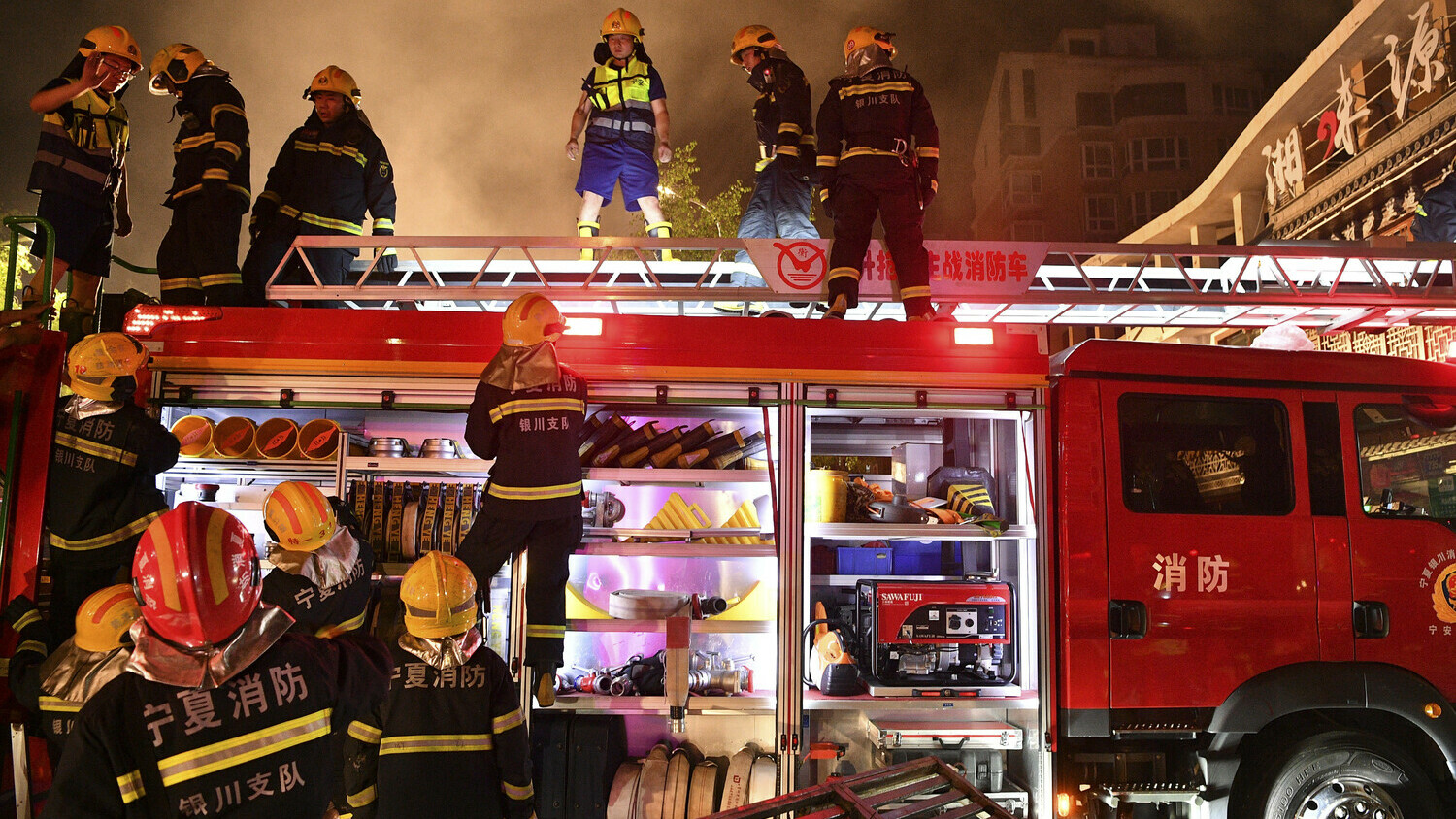
A gas leak at a barbecue restaurant in Yinchuan, northwest China, claimed the lives of 31 people. Following the explosion caused by a leaking liquefied gas tank, seven additional individuals were treated for burns and cuts, according to Xinhua on Thursday.
The explosion at the two-story establishment sparked a discussion on the safety of barbecue restaurants on Chinese social media. President Xi Jinping ordered a safety review across China, urging all regions to eliminate security risks and “hidden dangers”. rtr/cyb
On the fifth day of the fifth month in the Chinese lunar calendar, the Dragon Festival is celebrated throughout China. This year it falls on June 22.
However, the name “Dragon Boat Festival” is only for foreigners. In China, it is called Duanwu Festival. Dragon boat races are a tradition that mainly take place in the southern provinces, where there are more rivers. But there is one thing that people all over China do on Duanwu: Eating zongzi – a snack of glutinous rice wrapped in reed leaves and then cooked (here’s the Wikipedia entry).
Basic ingredients, shape and cooking process are the same. However, when someone asks how it should taste – sweet or savory – a war of words immediately ignites.
People from the north prefer sweet zongzi with a red bean and date filling; people from the south like their zongzi savory, with pork, salted egg yolk and other ingredients. Southerners consider sweet zongzi “unthinkable”. Northerners openly say that zongzi with meat are “disgusting”. On social media, this debate takes place every year at the time of the festival, and many people participate in it gleefully.
Another snack that causes such discussion among some is called “Dou Fu Nao” (豆腐脑) in the north and “Dou Hua” (豆花) in the south. It is very soft tofu served with sauce before being made into a firm shape. This time, the preferences are the other way around than zongzi: People from the north prefer to eat the specialty savory, while people from the south prefer sweet. Both sides regard the other’s preference as heresy.
In 2013, the debate came to such a head that some took to the White House website and wrote petitions to Barack Obama. In them, they asked him to declare whether the official flavor of douhua was sweet or savory. Over 2,000 people signed the petitions.
Of course, no one really takes these debates seriously; they’re just fun. But they show how strongly people from different regions feel about their usual tastes and what they think about other points of view.
Today, few would still start a petition at the White House, as Sino-American relations are deteriorating by the day. If someone did dare to do so, he would probably get little response or even an angry rebuke for asking the hegemonic Americans to interfere in China’s internal affairs.
The rivalry between North and South in terms of Zongzi and Dou Fu Dao / Dou Hua is quite even. However, when it comes to food, the Northern Chinese are generally mocked by the Southern Chinese, who are said to have a more refined taste.
One habit of Northerners that Southerners often laugh at is their obsession with jiaozi (饺子), the ravioli-like, usually boiled dumplings made of flour and fillings of various combinations of meat, vegetables, shrimp and mushrooms.
Jiaozi play a major role during Chinese New Year holidays. They are served not only at midnight on New Year’s Eve and New Year’s Day, but also on the third and fifth days of the new year. People from the north also eat jiaozi in mid-July, at the winter solstice and on other non-holiday occasions, such as family reunions and gatherings of friends.
People from the south jokingly say that people from the north eat jiaozi at all festivals and holidays, including Women’s Day and Christmas. Of course, this is not true. On Duanwu, for example, they eat zongzi.
I always thought there were only two things that Chinese taste buds could agree on: tomato egg stir-fry and Lao Gan Ma sauce. Tomato egg stir-fry is called the national dish of China, certainly because it is the most popular dish in all of China – at least among many Han Chinese. It is red and yellow, the same color combination as the flag of the People’s Republic.
But then a friend reminded me, “Did you forget? Southerners put sugar in, Northerners don’t.” They were right. So, unfortunately, I had to cross it off the list.
That leaves Lao Gan Ma, as a beacon of hope, the hot sauce invented some thirty years ago by an uneducated but industrious woman named Tao Huabi from the southwestern province of Guizhou. Lao Gan Ma means “old godmother”. In the United States, the sauce is referred to by some as “Angry Lady Sauce” because the picture of Tao on the label looks a bit grumpy.
Made from fermented black beans, dried chili peppers, oil, salt and sugar, the sauce has the reputation of being able to save all bland dishes and cooking mistakes. It is sold in every Chinese grocery store, in China and outside. Unfortunately, in recent years, there have been many complaints that the taste of the sauce is not as good as it used to be. China is in danger of losing this unique gastronomic bond between its people.
Erik Hirsch has been responsible for System Integration Interior / Quality Management at BMW Brilliance Automotive in Shenyang since April. Previously, he had worked for the BMW Group in Munich and Shanghai for more than ten years in various functions.
Kaixin Gritschmeier has been working as Project Controller/Country Representative China CKD at Audi in Ingolstadt since June. CKD (“Completely Knocked Down”) refers to the production of vehicles in which assemblies are delivered individually and only assembled in the importing country.
Is something changing in your organization? Let us know at heads@table.media!

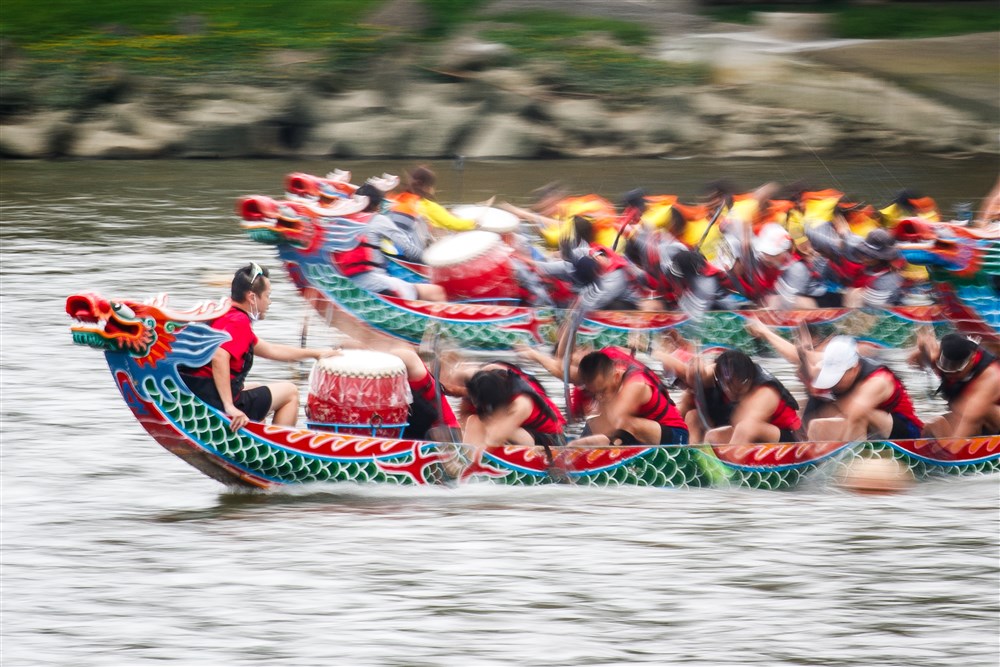
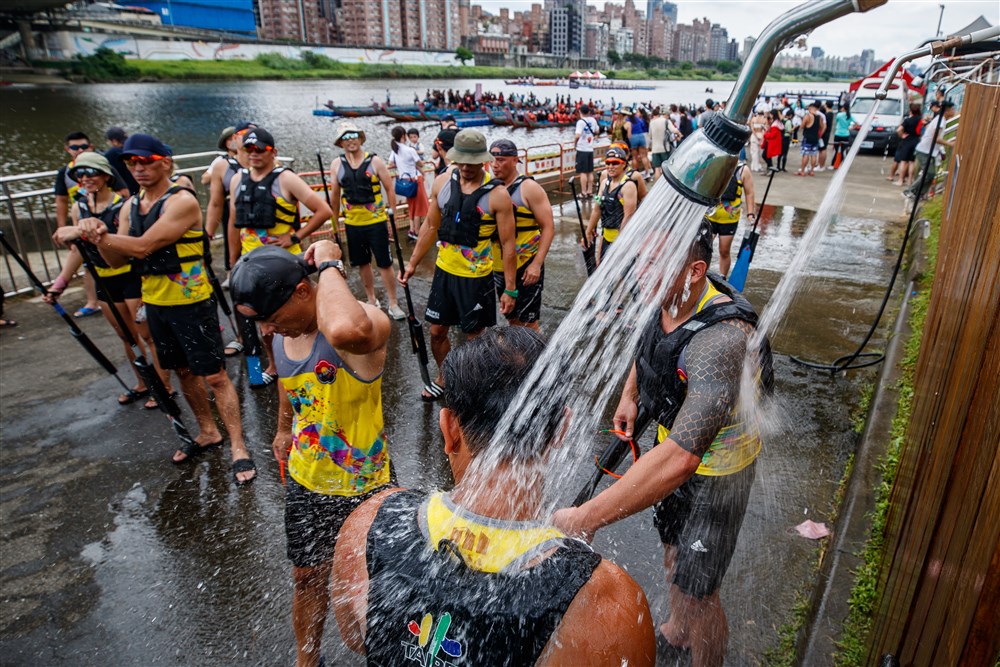
The Dragon Boat Festival is a highlight of the annual cycle in Chinese culture. It not only provides three days off, but also includes actual dragon boat races. However, on Sunday, the Chinese people have to go back to work. The extra day off comes at a cost.
The new automotive competition is on the rise: After Japan and South Korea, China, the third East Asian nation, is entering the global automotive market. Until the end of the pandemic, logistics were a bottleneck. However, the transport difficulties have since been resolved, as Christian Domke-Seidel writes. This year, China will export four million good, affordable cars for the first time. This should make the German automotive industry nervous. Spoiler: It is not primarily roaring combustion engines from China that are in high demand.
The complaint filed by the European Center for Constitutional and Human Rights (ECCHR) with the Federal Office for Economic Affairs and Export Control (BAFA) continues to concern us. The exact origin of many parts used by BMW, VW and Mercedes in China is still unclear. Many important suppliers produce in the Xinjiang province. Markus Krajewski, a law professor at the University of Erlangen-Nuremberg, assesses the validity of the complaint in an interview with Caspar Dohmen.
On Thursday, Olaf Scholz apparently wanted to somewhat make up for the damage caused by his cozy approach with Li Qiang. Scholz had adapted to China’s political culture on Tuesday and did not allow any questions during the “press conference” at the Chancellery. In front of the Bundestag, he reiterated Germany’s support for Taiwan and stated that he had warned Premier Li against any aggression towards the island state. The uneasy feeling after China’s propagandistic 1-0 victory in Berlin remains.


One in four cars built by Chinese manufacturers for export could not be exported last year. The capacities on ships and rail were too low. Now the People’s Republic is catching up because the supply routes have become accessible. In the first quarter of 2023 alone, almost 1.07 million vehicles left the country.
In 2022, Chinese automakers exported 3.1 million vehicles – this also marks an increase of 54 percent compared to the previous year. However, the manufacturers had built significantly more vehicles for export: more than four million units. One million vehicles were therefore left standing. For one simple reason: There was a lack of transport capacity. This is just beginning to change. The reason for this is new ships and flourishing rail traffic.
The development of new transport routes by rail is relieving the overburdened shipping traffic and boosting exports. For the current year, analysts expect China’s automakers to export more than four million cars for the first time. This would mean that the People’s Republic would replace Japan as the leading car export country. This has already been achieved in the first quarter: With the good 1 million vehicles that the country exported, according to the Chinese customs authority, it surpassed Japan’s 955,000 export cars.

The German car market is also feeling the effects of this development, as the Federal Statistical Office calculates. 28 percent of all cars that entered Germany from abroad came from China in the first quarter. Their share tripled compared to the same period last year.
A key problem for Chinese auto brands last year was export capacity. There was simply a lack of ships. More precisely: so-called RoRo ships. The name stands for “roll on – roll off” and means ships onto which cars and trucks can drive directly without first having to be packed into containers.
This makes loading easy and keeps the port infrastructure simple. Nor do modern cranes need to be used for this type of ship. The Clarkson consulting agency calculates that there are 760 RoRo ships in operation worldwide. However, only 51 of these are in Chinese hands, and they mainly serve domestic traffic.
China’s demand is therefore putting a steep upward pressure on the cost of renting these ships. In the past three years, the daily rent has increased eightfold to around 90,000 dollars, Caixin Global calculates. A trip to Europe would thus cost 5.4 million dollars. This is a real stumbling block for the industry, which currently still has to calculate with tight margins.
Last year, therefore, automakers made investments of their own. BYD, for example, has ordered eight RoRo vessels, each capable of carrying 7,700 vehicles, at a combined cost of nearly 700 million dollars. SAIC Motor has ordered vessels for about 300 million dollars. Bank of Communications Financial Leasing, which leases transportation equipment such as aircraft, ships and trucks and offers capacity to the market, has also recognized the demand and ordered a total of 43 RoRo vessels.
The export boom is also being boosted by the trend toward EVs. Every third vehicle that left China in the first five months of this year was electric. In May alone, there were 92,000 of the so-called New Energy Vehicles (NEV) – an increase of 136 percent compared to the same month last year. The increase is also due to the fact that sales growth in the People’s Republic has slowed down and a tough price war has broken out. Many manufacturers, therefore, prefer to focus on exports, where Chinese vehicles – especially NEVs – are gaining in popularity.
Until the fall of 2022, the NEVs placed an additional burden on the ports because batteries for EVs were not allowed to be transported by rail in China until then – for safety reasons. In spring 2021, Geely CEO Li Shufu submitted a request to the government to change the regulation. “Compared with sea and road transport, rail transport has enormous advantages, especially for long distances, in terms of economy, stability and CO2 emissions,” he said at the time, explaining the reason for the application.
Especially with regard to the New Silk Road and the plans of the Communist Party in the decarbonization and central industry development sectors, the move seemed to be well received. Since the end of last year, batteries, along with the cars around them, are now allowed to be transported by rail.
The announcement of the relaxation in battery transport regulations has triggered massive investments in the rail transport sector. For example, logistics company Toprail in Shanghai has provided twenty additional trains dedicated solely to NEV (New Energy Vehicles) transportation.
Brian Jang, Product Manager at Dachser Logistics in China and responsible for rail transport, expressed to the specialized portal New Silkroad Discovery: “NEVs will become another major product of Eurasian freight trains, following notebooks and white goods. We will see more trains for NEVs.”

What is the significance of ECCHR’s complaint to BAFA?
They basically point out to BAFA that the companies have not fulfilled their legal due diligence obligations. BAFA even provides a website for that, after all. It’s like a notice to an administrative authority. You could also go to the public order office and say, I think my neighbor is always dumping paint down the drain. Then the public order office has to consider whether or not to follow up on the tip. And in the same way, BAFA must now consider whether it wants to follow up on the current indications of the complaint.
In the complaint, ECCHR does not name any specific affected parties. Can one then still file such a complaint with BAFA?
Yes, one does not have to name any specific complainants, but it must be clearly expressed what types of due diligence violations might exist. Later, this could become important if BAFA does not act or does not act sufficiently in the eyes of the complainants. Then the complainants have the possibility to file a lawsuit against BAFA before the administrative court. This could be the next step.
The main reason for the complaint is that the information provided by the German automakers to date is insufficient to assess the extent to which they have addressed the risk of forced labor in the Xinjiang region in accordance with the requirements of the Supply Chain Act. Does the Supply Chain Act mean that companies have to show more transparency in this regard?
That is the idea of the law. They are required to report on what they have done specifically now. Practice will have to show how exactly this works now and what BAFA considers necessary. But I would say that if companies have been made aware of any human rights risk, then they have a duty to conduct follow-up research and must report transparently on what they have done. In any case, the law provides for significantly increased reporting and transparency obligations compared to what we had before. Previously, there was basically only an obligation based on the CSR reporting mandates.
Does BAFA now have to check whether the companies have plausibly fulfilled their obligations?
Yes, it has to actively check what the companies have done. To do this, it must come to an assessment itself. It also has the competence to evaluate the situation itself. But it does not have to take action in every case. If someone raises a complaint against a company about possible forced labor in the Upper Palatinate, and the company concerned says in a comprehensible way that this is nonsense, then the authority does not have to take action. There must be clear evidence of the risk in the region.
Now companies often say that they themselves, or even third parties such as auditors, cannot actually independently assess the situation in Xinjiang from a human rights perspective. And now China has also passed an anti-espionage law, making obtaining information more difficult. At the end of the day, is the only option left for companies to withdraw from the region if they want to act in accordance with the German supply chain law?
You have to be clear about that. There are enough well-documented reports on the human rights situation and forced labor in the Xinjiang region regarding automotive supply chains. If one were to speak about criminal law now, there would be an initial suspicion. If companies can’t refute that suspicion or say, we can’t adequately assess our risks, then they have to give up that business activity. Because according to the law, you are not allowed to have any areas in your supply chain where you are not at all able to assess the human rights risks.
June 27,2023, 08:30 a.m. (2:30 p.m. Beijing time)
China Network Baden-Wuerttemberg, Workshop: Michael Shi: Success Factors for Trade Fairs More
June 27, 2023; 10 a.m. (4 p.m. Beijing time)
EU SME Centre, Webinar: Build a Strong Team in China: Mastering the Art of Hiring and Training Talent More
June 27, 2023; 9 p.m. (June 28, 3 a.m. Beijing time)
Center for Strategic & International Studies, Webcast: Promoting Semiconductor “Friendshoring”: The Role of Indo-Pacific Allies and Partners in Supply Chain Resilience More
June 28, 2023; 3 p.m. (9 p.m. Beijing time)
Center for Strategic & International Studies, Webcast: Thirteenth Annual South China Sea Conference More
June 29, 2023; 10 a.m.
Zhejiang Government / PwC Germany / PwC China, Networking Event (Frankfurt): Zhejiang – Germany Business Dialogue More

China’s Premier Li Qiang has traveled on to France following German-Chinese government consultations, where he took part in a summit for a new global financing pact. The summit, organized by French leader Emmanuel Macron, will be held on Thursday and Friday. A speech by Li Qiang is expected on Friday.
The financial summit in Paris will focus, among other things, on how the international financial system can be restructured to support poorer countries in overcoming the climate crisis, for example, through debt relief. China was explicitly invited to the summit at Macron’s request. That’s because the People’s Republic, which is the world’s largest bilateral creditor, is pushing for lenders such as the World Bank or the International Monetary Fund to absorb some of the losses should countries be unable to repay their debts. Financial institutions and richer countries oppose that. That is why Li’s speech is eagerly awaited.
On the first day of the summit, the participants talked about a possible taxation of maritime traffic. Neither China nor the US, however, had expressed a positive view of the move, Table.Media learned on the ground. Most of the countries supporting the idea are from Europe, Asia and the Pacific region. Partnerships for green growth and CO2 pricing were also debated.
Earlier on Wednesday, Li Qiang met France’s Prime Minister Élisabeth Borne and French Economy Minister Bruno Le Maire. Li also attended a dinner of the France-China Committee, a group of French industrialists with business in China. Members include the heads of leading French companies, including L’Oréal, BNP Paribas, LVMH, Thales and Sanofi. China’s Minister of Commerce, Wang Wentao, also attended the meeting. cst/ari
Beijing wants to further accelerate the expansion of charging infrastructure for EVs. New guidelines issued by the State Council call for the construction of charging networks linking major cities for long-distance traffic. The guidelines also provide for NEV charging stations in public places, such as gas stations or transportation hubs. With the new guidelines, the government wants to push the expansion of the charging infrastructure into the hinterland and into smaller cities.
So far, the bulk of charging stations and charging posts are concentrated in the comparatively affluent regions and cities along the coast. Along highways, in rural regions, and more generally in western areas of China, charging stations remain scarce, according to analysts at Trivium China. This is despite the fact that the network of NEV charging stations has increased by a factor of 31 since 2016. As a result, the ratio of EVs to charging stations has risen from 5.3:1 to a healthy 2.5:1, according to Trivium. But without more charging stations at home, the EV boom is unlikely to continue.
One problem is the lack of profitability of the charging stations. This deters private providers in particular. The new guidelines, therefore, aim to generate more revenue. For example, some stations will be exempt from certain fees. They also want to help local governments issue local purpose bonds and green bonds to finance infrastructure development. “Convincing private charging companies to expand into an unprofitable market requires significant funding – especially in the form of investment subsidies,” Trivium China writes. However, there is no evidence of such support to date, it adds. ck
The photovoltaic group Longi from Xi’an has plans for a plant in Germany, as reported by the Handelsblatt. The final decision should be made in six months, Longi founder Li Zhengguo told the newspaper. Preparations are already underway.
The German government is currently interested in reestablishing solar manufacturers on domestic soil. The industry in Germany has become dormant since Chinese competitors emerged with cheaper prices. However, Chinese products have several disadvantages in the current environment. They contribute to dependency and there are uncertainties regarding the supply chain for the raw material polysilicon. fin
If the conflict between China and Taiwan escalates into war, sanctions imposed by the G7 could have expensive consequences, not only for the People’s Republic but also for the rest of the world. This has been analyzed by the consulting firm Rhodium. In a worst-case scenario that includes sanctions against the largest institutions of the Chinese banking system, the consulting agency estimates that trade and financial flows of at least three trillion US dollars – excluding currency reserves – would be immediately at risk. This corresponds to half of Germany’s total annual economic output in terms of magnitude.
Even less dramatic scenarios involving targeted sanctions against specific sectors would still result in significant economic damage. Measures against China’s aerospace industry, for example, would directly impact the exports of the G7 to China and cause damage of at least 2.2 billion US dollars (two billion euros).
Following the conclusion of the German-Chinese government consultations, Chancellor Olaf Scholz reiterated in a government statement that China should refrain from using violence against the island state of Taiwan. He also conveyed this message to Chinese Premier Li Qiang during his visit. “We strongly reject all unilateral attempts to change the status quo in the East and South China Seas through violence or coercion,” said Scholz. “This applies particularly to Taiwan.” cyb

A gas leak at a barbecue restaurant in Yinchuan, northwest China, claimed the lives of 31 people. Following the explosion caused by a leaking liquefied gas tank, seven additional individuals were treated for burns and cuts, according to Xinhua on Thursday.
The explosion at the two-story establishment sparked a discussion on the safety of barbecue restaurants on Chinese social media. President Xi Jinping ordered a safety review across China, urging all regions to eliminate security risks and “hidden dangers”. rtr/cyb
On the fifth day of the fifth month in the Chinese lunar calendar, the Dragon Festival is celebrated throughout China. This year it falls on June 22.
However, the name “Dragon Boat Festival” is only for foreigners. In China, it is called Duanwu Festival. Dragon boat races are a tradition that mainly take place in the southern provinces, where there are more rivers. But there is one thing that people all over China do on Duanwu: Eating zongzi – a snack of glutinous rice wrapped in reed leaves and then cooked (here’s the Wikipedia entry).
Basic ingredients, shape and cooking process are the same. However, when someone asks how it should taste – sweet or savory – a war of words immediately ignites.
People from the north prefer sweet zongzi with a red bean and date filling; people from the south like their zongzi savory, with pork, salted egg yolk and other ingredients. Southerners consider sweet zongzi “unthinkable”. Northerners openly say that zongzi with meat are “disgusting”. On social media, this debate takes place every year at the time of the festival, and many people participate in it gleefully.
Another snack that causes such discussion among some is called “Dou Fu Nao” (豆腐脑) in the north and “Dou Hua” (豆花) in the south. It is very soft tofu served with sauce before being made into a firm shape. This time, the preferences are the other way around than zongzi: People from the north prefer to eat the specialty savory, while people from the south prefer sweet. Both sides regard the other’s preference as heresy.
In 2013, the debate came to such a head that some took to the White House website and wrote petitions to Barack Obama. In them, they asked him to declare whether the official flavor of douhua was sweet or savory. Over 2,000 people signed the petitions.
Of course, no one really takes these debates seriously; they’re just fun. But they show how strongly people from different regions feel about their usual tastes and what they think about other points of view.
Today, few would still start a petition at the White House, as Sino-American relations are deteriorating by the day. If someone did dare to do so, he would probably get little response or even an angry rebuke for asking the hegemonic Americans to interfere in China’s internal affairs.
The rivalry between North and South in terms of Zongzi and Dou Fu Dao / Dou Hua is quite even. However, when it comes to food, the Northern Chinese are generally mocked by the Southern Chinese, who are said to have a more refined taste.
One habit of Northerners that Southerners often laugh at is their obsession with jiaozi (饺子), the ravioli-like, usually boiled dumplings made of flour and fillings of various combinations of meat, vegetables, shrimp and mushrooms.
Jiaozi play a major role during Chinese New Year holidays. They are served not only at midnight on New Year’s Eve and New Year’s Day, but also on the third and fifth days of the new year. People from the north also eat jiaozi in mid-July, at the winter solstice and on other non-holiday occasions, such as family reunions and gatherings of friends.
People from the south jokingly say that people from the north eat jiaozi at all festivals and holidays, including Women’s Day and Christmas. Of course, this is not true. On Duanwu, for example, they eat zongzi.
I always thought there were only two things that Chinese taste buds could agree on: tomato egg stir-fry and Lao Gan Ma sauce. Tomato egg stir-fry is called the national dish of China, certainly because it is the most popular dish in all of China – at least among many Han Chinese. It is red and yellow, the same color combination as the flag of the People’s Republic.
But then a friend reminded me, “Did you forget? Southerners put sugar in, Northerners don’t.” They were right. So, unfortunately, I had to cross it off the list.
That leaves Lao Gan Ma, as a beacon of hope, the hot sauce invented some thirty years ago by an uneducated but industrious woman named Tao Huabi from the southwestern province of Guizhou. Lao Gan Ma means “old godmother”. In the United States, the sauce is referred to by some as “Angry Lady Sauce” because the picture of Tao on the label looks a bit grumpy.
Made from fermented black beans, dried chili peppers, oil, salt and sugar, the sauce has the reputation of being able to save all bland dishes and cooking mistakes. It is sold in every Chinese grocery store, in China and outside. Unfortunately, in recent years, there have been many complaints that the taste of the sauce is not as good as it used to be. China is in danger of losing this unique gastronomic bond between its people.
Erik Hirsch has been responsible for System Integration Interior / Quality Management at BMW Brilliance Automotive in Shenyang since April. Previously, he had worked for the BMW Group in Munich and Shanghai for more than ten years in various functions.
Kaixin Gritschmeier has been working as Project Controller/Country Representative China CKD at Audi in Ingolstadt since June. CKD (“Completely Knocked Down”) refers to the production of vehicles in which assemblies are delivered individually and only assembled in the importing country.
Is something changing in your organization? Let us know at heads@table.media!



The Dragon Boat Festival is a highlight of the annual cycle in Chinese culture. It not only provides three days off, but also includes actual dragon boat races. However, on Sunday, the Chinese people have to go back to work. The extra day off comes at a cost.
